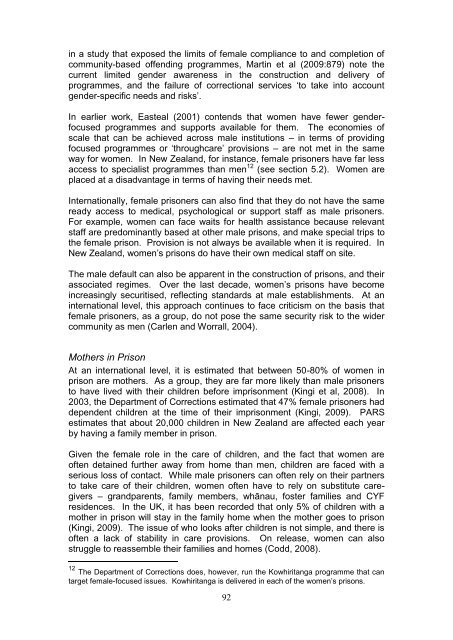Human Rights and Prisons - Rethinking Crime and Punishment
Human Rights and Prisons - Rethinking Crime and Punishment
Human Rights and Prisons - Rethinking Crime and Punishment
You also want an ePaper? Increase the reach of your titles
YUMPU automatically turns print PDFs into web optimized ePapers that Google loves.
in a study that exposed the limits of female compliance to <strong>and</strong> completion of<br />
community-based offending programmes, Martin et al (2009:879) note the<br />
current limited gender awareness in the construction <strong>and</strong> delivery of<br />
programmes, <strong>and</strong> the failure of correctional services „to take into account<br />
gender-specific needs <strong>and</strong> risks‟.<br />
In earlier work, Easteal (2001) contends that women have fewer genderfocused<br />
programmes <strong>and</strong> supports available for them. The economies of<br />
scale that can be achieved across male institutions – in terms of providing<br />
focused programmes or „throughcare‟ provisions – are not met in the same<br />
way for women. In New Zeal<strong>and</strong>, for instance, female prisoners have far less<br />
access to specialist programmes than men 12 (see section 5.2). Women are<br />
placed at a disadvantage in terms of having their needs met.<br />
Internationally, female prisoners can also find that they do not have the same<br />
ready access to medical, psychological or support staff as male prisoners.<br />
For example, women can face waits for health assistance because relevant<br />
staff are predominantly based at other male prisons, <strong>and</strong> make special trips to<br />
the female prison. Provision is not always be available when it is required. In<br />
New Zeal<strong>and</strong>, women‟s prisons do have their own medical staff on site.<br />
The male default can also be apparent in the construction of prisons, <strong>and</strong> their<br />
associated regimes. Over the last decade, women‟s prisons have become<br />
increasingly securitised, reflecting st<strong>and</strong>ards at male establishments. At an<br />
international level, this approach continues to face criticism on the basis that<br />
female prisoners, as a group, do not pose the same security risk to the wider<br />
community as men (Carlen <strong>and</strong> Worrall, 2004).<br />
Mothers in Prison<br />
At an international level, it is estimated that between 50-80% of women in<br />
prison are mothers. As a group, they are far more likely than male prisoners<br />
to have lived with their children before imprisonment (Kingi et al, 2008). In<br />
2003, the Department of Corrections estimated that 47% female prisoners had<br />
dependent children at the time of their imprisonment (Kingi, 2009). PARS<br />
estimates that about 20,000 children in New Zeal<strong>and</strong> are affected each year<br />
by having a family member in prison.<br />
Given the female role in the care of children, <strong>and</strong> the fact that women are<br />
often detained further away from home than men, children are faced with a<br />
serious loss of contact. While male prisoners can often rely on their partners<br />
to take care of their children, women often have to rely on substitute caregivers<br />
– gr<strong>and</strong>parents, family members, whānau, foster families <strong>and</strong> CYF<br />
residences. In the UK, it has been recorded that only 5% of children with a<br />
mother in prison will stay in the family home when the mother goes to prison<br />
(Kingi, 2009). The issue of who looks after children is not simple, <strong>and</strong> there is<br />
often a lack of stability in care provisions. On release, women can also<br />
struggle to reassemble their families <strong>and</strong> homes (Codd, 2008).<br />
12 The Department of Corrections does, however, run the Kowhiritanga programme that can<br />
target female-focused issues. Kowhiritanga is delivered in each of the women‟s prisons.<br />
92
















